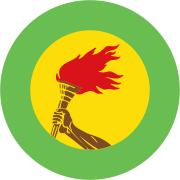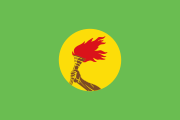The Popular Movement of the Revolution (French: Mouvement Populaire de la Révolution, abbr. MPR) was the ruling political party in Zaire (known for part of its existence as the Democratic Republic of the Congo). For most of its existence, it was the only legally permitted party in the country. It was founded by Joseph-Désiré Mobutu (later Mobutu Sese Seko) on 20 May 1967.
Popular Movement of the Revolution Mouvement populaire de la Révolution | |
|---|---|
 | |
| Abbreviation | MPR |
| President | Mobutu Sese Seko |
| Founder | Mobutu Sese Seko |
| Founded | 20 May 1967 |
| Dissolved | 16 May 1997 |
| Succeeded by | Union of Mobutuist Democrats (not legal successor) |
| Headquarters | Kinshasa, Zaire |
| Ideology | Mobutism |
| Political position | Syncretic (de jure) Far-right[1][2] (de facto) |
| Colors | Green |
| Party flag | |
 | |
Ideology edit
The official ideology of the MPR, as laid down in the Manifesto of N'sele in May 1967, incorporated "nationalism", "revolution", and "authenticity". Revolution was described as a "truly national revolution, essentially pragmatic," which called for "the repudiation of both capitalism and communism."[3] One of the MPR's slogans was "Neither left nor right," to which would be added "nor even centre" in later years.[3] Nevertheless, historians consider Mobutu's regime to be right-wing[4][5] and there is evidence of economic liberalization during Mobutu's rule as he appointed Léon Kengo wa Dondo, a prominent advocate of free market reform, as prime minister. Some historians, such as Michel Ugarte and Max Liniger-Goumaz, argue that Mobutu's Zaire was part of a phenomenon called "tropical fascism" due to its authoritarianism, anti-communism, and Third Positionist rhetoric.[6]
One-party period edit
From its formation in 1967 to 1990, the MPR was de facto the only legal party in the country. The 1967 constitution explicitly allowed the existence of two parties.[7] However, the MPR was the only party allowed to nominate candidates in presidential and parliamentary elections held in November 1970. A month later, on 23 December, the constitution was amended to formally declare the MPR to be the only legally permitted party.[8][9]
The 1974 constitution enshrined the MPR's status as the vanguard of the nation. It stated that "there exists a single institution, the MPR, incarnated by its President," that the "President of the MPR is ex officio President of the Republic, and holds the plenitude of power exercise," and that "Mobutism" was constitutional doctrine. All citizens of Zaire became members of the MPR at birth.[10] In effect, the government was a transmission belt for the MPR.
The MPR elected its president every seven years at its national convention (five years before 1978). At that time, the MPR's president was automatically nominated as the sole candidate for a seven-year term as president of the republic; he was confirmed in office by a national referendum. Mobutu was elected unopposed as president three times under this system, with official figures showing an implausible 98 percent or more of voters approving his candidacy against at most 1.8 percent either voting "no," casting blank ballots or spoiling their ballot papers. Every five years, a single list of MPR candidates was returned to the legislature, with unanimous or near-unanimous support. All of these candidates were effectively handpicked by Mobutu.
In 1975, formal elections were dispensed with altogether. Instead, the MPR list was approved by acclamation; candidates were simply brought out at stadiums and other public places and cheered by the audiences.
For all intents and purposes, the MPR and the government were one. This effectively gave Mobutu complete political control over the country.
Multi-party period edit
The single-party system lasted until 24 April 1990, the date of the proclamation of the Third Republic. On that date, Mobutu said that three political parties would be allowed. The "moderate" and "hardline" factions of the MPR would form separate parties, while the third party would be the Union for Democracy and Social Progress (UDPS).[11] Under the new multiparty system, Mobutu said that he would be above political parties, and accordingly he resigned as the president of the MPR on the same date, although he again accepted the post of party president a year later, on 21 April 1991.[12]
The party had no real ideology other than support for Mobutu. As such, it disappeared in short order when Mobutu was overthrown by Laurent-Désiré Kabila in 1997, during the First Congo War. Nzanga Mobutu, the son of Mobutu Sese Seko, is the chairman of the Union of Mobutuist Democrats (UDEMO), a Mobutist political party in parliament.
Electoral history edit
Presidential elections edit
| Election | Party candidate | Votes | % | Result |
|---|---|---|---|---|
| 1970 | Mobutu Sese Seko | 10,131,669 | 100% | Elected |
| 1977 | 10,693,804 | 98.2% | Elected | |
| 1984 | 14,885,997 | 99.1% | Elected |
Parliamentary elections edit
| Election | Party leader | Votes | % | Seats | +/– | Position | Result |
|---|---|---|---|---|---|---|---|
| 1970 | Mobutu Sese Seko | 9,691,132 | 99% | 420 / 420
|
420 | 1st | Sole legal party |
| 1975 | Approved by acclamation[13] | 244 / 244
|
176 | 1st | Sole legal party | ||
| 1977 | 10,180,685 | 100% | 289 / 289
|
45 | 1st | Sole legal party | |
| 1982 | 310 / 310
|
21 | 1st | Sole legal party | |||
| 1987 | 210 / 210
|
100 | 1st | Sole legal party | |||
References edit
- ^ Schmitz, David F.The United States and Right-wing Dictatorships, 1965-1989.Cambridge: Cambridge University Press, 2006.
- ^ Afoaku, Osita G. (1997). "The U.S. And Mobutu Sese Seko: Waiting on Disaster". Journal of Third World Studies. 14 (1): 65–90. JSTOR 45193674.
- ^ a b Crawford Young and Thomas Turner, The Rise and Decline of the Zairian State, p. 210
- ^ Schmitz, David F.The United States and Right-wing Dictatorships, 1965-1989.Cambridge: Cambridge University Press, 2006.
- ^ Afoaku, Osita G. (1997). "The U.S. And Mobutu Sese Seko: Waiting on Disaster". Journal of Third World Studies. 14 (1): 65–90. JSTOR 45193674.
- ^ Michel Ugarte. Africans in Europe: the culture of exile and emigration from Equatorial Guinea to Spain. University of Illinois Press, 2010. Pp. 25.
- ^ "Congo ex-belge, Constitution de 1967, Digithèque MJP".
- ^ Kaplan, Irving (ed.). Zaire: A Country Study. Third Edition, First Printing. 1979.
- ^ Law 70-001 of 23 December 1970 amended the text of article 4 of the constitution as follows: "The Popular Movement of the Revolution is the only political party in the Republic" (Le Mouvement populaire de la révolution est le seul parti politique de la République.).
- ^ Young and Turner, p. 70
- ^ Thomas Turner, "Flying High Above the Toads: Mobutu and Stalemated Democracy", in Political Reform in Francophone Africa (1997), ed. John F. Clark and David E. Gardinier, page 255.
- ^ Zaire: A Country Study POLITICAL REFORM IN THE 1990s - Proclamation of the Third Republic
- ^ Zaire Inter-Parliamentary Union